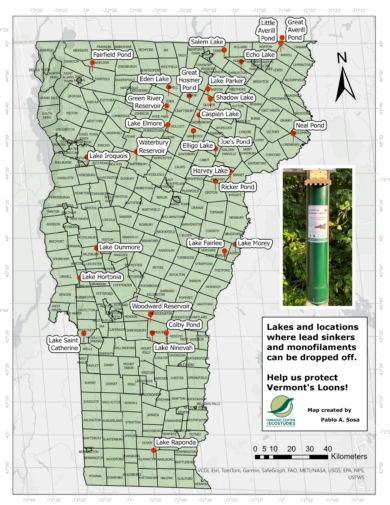Norwich, VT – The Fish Lead Free Project launched by the Vermont Center for Ecostudies (VCE) in partnership with local lake associations and the Vermont Fish & Wildlife Department aims to help anglers adopt loon-friendly fishing practices more easily.
VCE and partners have installed collection tubes at boat access areas at 24 bodies of water across the state for anglers to easily and safely discard lead sinkers plus unwanted monofilament lines and hooks. By getting lead out of people’s tackle boxes, loon biologists hope to reduce future loon and other wildlife mortalities.
In 2007, a ban on the sale and use of lead sinkers one-half-ounce or less in Vermont yielded mixed results. Within the law’s first decade, loon mortality rates attributed to lead tackle decreased three-fold. However, VCE has documented a substantial increase in lead fishing gear mortalities from 2019 through 2023, averaging two to three loons dying from lead each year.
“Despite efforts to reduce instances of lead poisoning in loons it remains one of the leading causes of death among the state’s adult loons,” says VCE loon biologist Eric Hanson. “Since 2019, 20 percent of all adult loon deaths were attributed to ingestion of lead sinkers, monofilament lines, and hooks.”
Lead is widely known for its neurotoxic effects on both people and animals. When it comes to loons, consuming even a small split lead fishing sinker is fatal. Typically, by the time a loon shows symptoms of lead poisoning, it’s too late, and the only humane option is euthanization. “Thankfully, affordable non-lead sinker options exist,” says Vermont Fish & Wildlife’s Bird Biologist Jill Kilborn. “And we wanted to provide a convenient option for safely disposing of lead tackle as anglers swap out with safer alternatives.”
VCE’s lead gear collection tubes have a unique design that is based on a model created by Friends of Waterbury Reservoir. At each site, volunteers and lake association members will monitor tube use, while VCE will track data and properly dispose of collected tackle. Lead tackle collection tubes are located at the following boat access areas on Vermont lakes and ponds: Caspian, Dunmore, Echo (Charleston), Elmore, Fairfield, Fairlee, Great Averill, Harvey’s, Hortonia, Iroquois, Joe’s, Little Averill, Morey, Neal, Ninevah, Parker, Raponda, Ricker, Shadow (Glover), St. Catherine, Waterbury, Woodbury, Woodward. (Please see included map.) Many solid waste collection sites will also recycle metals.
Please keep an eye on https://vtecostudies.info/loons-and-lead for an updated list as more sites become available.
To learn more about lead tackle and loons, visit the VCE webpage or email .
-30-
Images Available for Use:
Use of the provided image is protected by copyright and permitted only within stories about the content of this press release. Redistribution or any other use is prohibited without express written permission of the Vermont Center for Ecostudies or the copyright owner.

